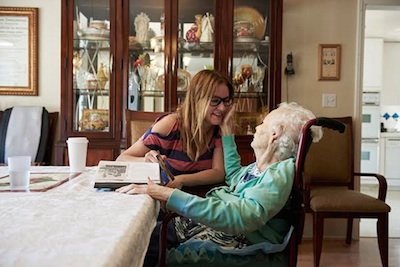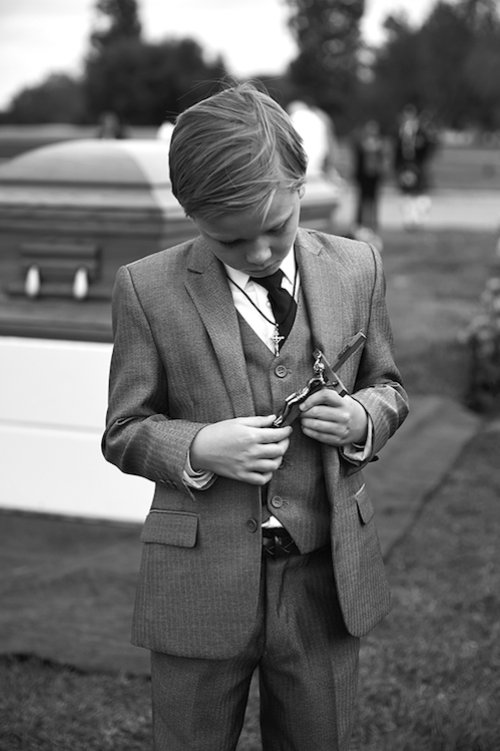Photographer Profile - Joan Allen: "I think it's time to get back to work"

|
|
|
“We had a lot of family there, and the siblings who couldn’t be there FaceTimed, we had cake for the caregivers, and we sang,” she says. “I didn’t want to go home because I knew mom was having a bad day, but it got late and I said to my sister I thought we should go home and get some sleep. And five minutes after I got home they called me and said mom had passed away.”
Allen is a Los Angeles-based freelance commercial and editorial photographer whose client list includes Vanity Fair, NBC Universal, Rolling Stone, Simon & Schuster, Bacardi, Cosmopolitan, Allure and Vogue. But she hasn't been doing much in that line recently — not for some time, actually.
In 2009, Allen’s mother was diagnosed with Alzheimer’s Disease. It didn’t come as a surprise, Allen noted in an article at Pro Photo Daily in 2015. “We had had concerns beginning when she was still in her 60s. This didn’t make the words spoken aloud any less shocking,” she said at the time.
Allen and her siblings were suddenly faced with difficult choices. Eventually it became clear that their mother needed round-the-clock attention, and she was moved to a memory-care home. “Our worst fear played out in front of us,” Allen told Pro Photo Daily. “After being very happy there for three years, mom sustained a mysterious head injury and had been hemorrhaging for a week without any medical attention, nor her family being notified. We rushed her to the UCLA Emergency Room, where she was immediately admitted for her injury in addition to severe malnutrition.” She was later moved to a hospice.
After her mother’s initial diagnosis, Allen essentially put her photography career on hold. But she never stopped being a photographer. As she cared for her mother, she also began creating a photographic record of their days together.
“I started in 2009, when she lived in her own home,” Allen says. “When we realized she was going to need 24/7 care, I thought I could be with her up to 72 hours at a time by myself, just to relieve the caregivers. That’s when I stopped caring about my photography career. I would take jobs here and there, but I wanted to just spend time with my mom.”
Early on, Allen shot portraits of her mother, for the most part, but over time the work changed. “I found it unbearable to see the changes in her as she was declining, to know that I was losing her a little every day,” she says. “When I started taking photographs of her, it almost felt like a protective shield — like, okay, if I can turn this into a personal project, it’s almost easier to deal with than just losing my mom.”

Allen ended up entering a number of the pictures in the American Photography 32 competition, and she was selected as a winner. She says she would also like to use the photos she’s taken of her mother over the years to help raise awareness of Alzheimer’s. “I’ve been in contact with the Alzheimer’s Association, and I have a documentary filmmaker friend who wants to look at all the photos and video footage I’ve taken and potentially do a short film,” she says.
But for now the work remains fundamentally personal in nature. “And now,” Allen says, “I think it’s time to get back to work. I’m exciting about that — printing new promo pieces, circling back to New York to see editors, and shooting again. ”
The Image Hoarders
Allen grew up in Lancaster, California, about an hour from Los Angeles. Her father, a police officer, died in 1991, after which her family found photographs he’d been taking over the years. “We didn’t know it, but he always had a camera with him in his police car,” she says.
She discovered photography while attending California State University, Northridge. When her boyfriend at the time moved to Canada to work on a television show, she went along and found herself shooting for local modeling agencies and makeup artists. “After people found out I was from LA, doors just opened,” she says. “I spent the entire year creating a sort-of fashion and beauty portfolio through trial and error. I had no idea what I was doing and no lighting equipment. I would use flashlights, lamps, car headlights — anything I could get my hands on.”

Back in Los Angeles, she found a job answering phones in the studio of photographer Dan Winters. After a year and a half she was helping to produce shoots but wanted more experience and started freelancing as an assistant for other photographers in the area.
“Art Streiber really took me under his wing,” she says. “To this day he has been a mentor and generous with his time and advice. I consider myself one of the lucky ones who became part of his family — that’s how I think of it. The most important thing I learned from him is how I wanted to treat people in the business and how to be part of a supportive group.”
During the years she was caring for her mother, Allen found support for her photography as part of a group of eight young LA-based photographers called the Image Hoarders. It was started, not coincidently, by Art Streiber’s former first assistant, Coral von Zumwalt.
The Most Wonderful Gift
“When she left Art, she didn’t feel like she had the kind of supportive community that she’d come to depend on, so she invited a number of people together to start this group,” Allen says. “It allowed us to share ideas and get feedback about personal projects we were working on or thinking about working on.”
The group also takes on collaborative efforts. One resulted in a book called Aging Out — a documentary project looking at the lives of 11 young people in the process of aging out of the foster-care system in Southern California. Another project is called simply “Youth.” And for Allen, working on it has been an opportunity to view her own personal experiences in a new way.
“The only guideline we gave ourselves was to document someone under 18 years of age,” says Allen. “One person is photographing a talented 13-year-old dancer, and another is following kids in a punk scene. But I had no idea what I was going to photograph.”

She stumbled on an idea when she volunteered to shoot family portraits for a friend whose father was terminally ill.
“He was sent home with two weeks to six months to live, and I told my friend I would like to come over and photograph her family all together. Her dad had a strong day and we went out on their patio and got some great photographs. Later I got to thinking how this man had been surrounded by all the kids in the family, and how the kids were experiencing loss. So I asked my friend if she would be open to me documenting her kids growing up through this experience.”
The work, for Allen, is a way of looking back and looking ahead.
A few months after her mother died, she was reminded of the emotional power that photographs have as personal documents. She found two boxes filled with transparencies her mother shot in 1959, when she spent a college semester in Hawaii. “I always knew her as our strict mom in a hectic house with nine kids and four dogs,” Allen says. “As I began scanning her images, I had tears in my eyes, because I was seeing her as a young free-spirited woman, and I finally realized how I am who I am. I felt like I was looking at me.” Allen calls the photographs “the most wonderful gift.”


